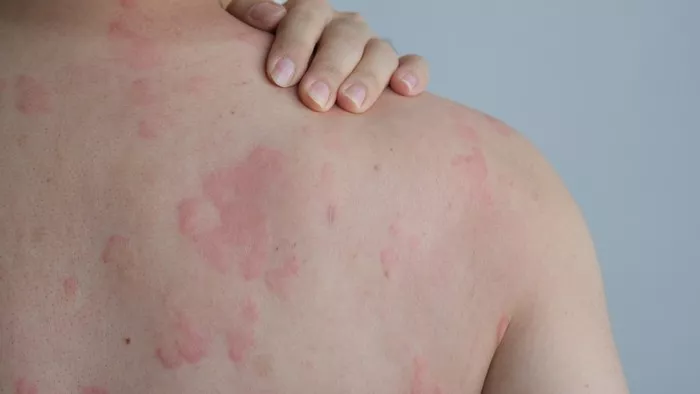Hives, medically termed urticaria, are a common skin condition characterized by red, swollen welts or bumps that appear suddenly on the skin. These welts can be intensely itchy and may vary in size and shape. While hives can be triggered by a variety of factors, including allergies, stress, and certain medications, they are primarily caused by the release of histamine in the body. Histamine is a chemical released by the immune system in response to allergens or other triggers, leading to the characteristic symptoms of hives.
Managing hives often involves addressing the underlying cause and alleviating symptoms such as itching and inflammation. While conventional antihistamine medications are commonly prescribed for hives, many individuals seek natural alternatives due to concerns about potential side effects or a desire for a more holistic approach to health.
In this article, we’ll explore some natural antihistamines that may help alleviate hives and their associated symptoms.
Understanding Natural Antihistamines
Natural antihistamines are substances found in foods, herbs, and supplements that possess properties similar to conventional antihistamine medications. These compounds work by blocking the effects of histamine, thereby reducing inflammation and relieving symptoms such as itching and swelling. Unlike prescription antihistamines, natural antihistamines are often gentler on the body and may offer additional health benefits.
Quercetin
Quercetin is a flavonoid found in many fruits, vegetables, and herbs. It is known for its potent antioxidant and anti-inflammatory properties, as well as its ability to inhibit the release of histamine from immune cells. By stabilizing mast cells, which are responsible for releasing histamine, quercetin can help reduce the severity of allergic reactions, including hives.
Foods rich in quercetin include apples, onions, citrus fruits, berries, broccoli, and leafy greens. Quercetin supplements are also available and can be taken to supplement dietary intake. However, it’s important to consult with a healthcare professional before starting any new supplement regimen, especially if you have underlying health conditions or are taking medications.
SEE ALSO: What Is Spontaneous Urticaria
Vitamin C
Vitamin C, also known as ascorbic acid, is a powerful antioxidant that plays a crucial role in immune function and histamine metabolism. Like quercetin, vitamin C can help stabilize mast cells and reduce the release of histamine in response to allergens or other triggers. Additionally, vitamin C has been shown to have anti-inflammatory properties, which can further alleviate symptoms of hives.
Foods high in vitamin C include citrus fruits, strawberries, kiwi, bell peppers, and broccoli. Vitamin C supplements are widely available and can be taken to support immune health and reduce histamine-related symptoms. However, it’s essential to choose a high-quality supplement and follow dosage recommendations to avoid adverse effects.
Stinging Nettle
Stinging nettle, or Urtica dioica, is a perennial plant that has been used for centuries in traditional medicine to treat a variety of ailments, including allergies and inflammatory conditions like hives. The leaves of the stinging nettle plant contain compounds that act as natural antihistamines, inhibiting the release of histamine and reducing inflammation.
Stinging nettle can be consumed as a tea, tincture, or supplement. Some people also apply stinging nettle topically in the form of creams or ointments to relieve itching and inflammation associated with hives. While generally considered safe, stinging nettle may cause side effects in some individuals, such as gastrointestinal upset or allergic reactions. It’s advisable to start with a low dose and monitor for any adverse effects when using stinging nettle as a natural remedy for hives.
Bromelain
Bromelain is a mixture of enzymes found in pineapple juice and the stem of the pineapple plant. It is well-known for its anti-inflammatory properties and ability to reduce swelling and inflammation in various conditions, including hives. Bromelain works by modulating the immune response and inhibiting the production of inflammatory compounds, including histamine.
Supplemental bromelain is available in capsule or tablet form and is often used to support digestive health and reduce inflammation. While bromelain is generally safe for most people, individuals with certain medical conditions, such as bleeding disorders or allergies to pineapple, should exercise caution and consult with a healthcare professional before using bromelain supplements.
Conclusion
Natural antihistamines offer a promising alternative for individuals seeking relief from hives without the potential side effects associated with conventional medications. Quercetin, vitamin C, stinging nettle, and bromelain are just a few examples of natural compounds that can help alleviate symptoms of hives by blocking the release of histamine and reducing inflammation.
However, it’s essential to remember that natural remedies may not be suitable for everyone, and their efficacy may vary from person to person. It’s always a good idea to consult with a qualified healthcare professional before starting any new treatment regimen, especially if you have underlying health conditions or are taking medications.
In addition to natural antihistamines, lifestyle modifications such as stress management, avoiding known triggers, and maintaining a healthy diet and exercise routine can also play a significant role in managing hives and promoting overall well-being. By taking a holistic approach to health and incorporating natural remedies into your routine, you can effectively manage hives and enjoy improved quality of life.
Related Topics:



























